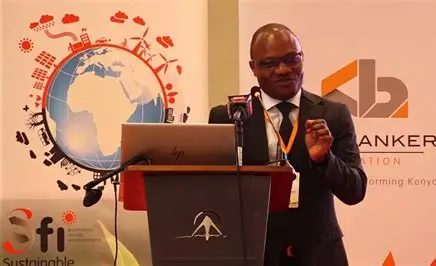
With an economy that sometimes appears to be in a spin, Kenya is aggressively heavily in charm offensive to lure more investors from Europe as it looks to hold off impact of over-borrowing, non-priority spending and theft of public resources by senior member of the government.
On Saturday, Principal Secretary for Trade and Industrialisation Alfred K’Ombudo made it clear the Kenya government willingness and readiness to diversify from traditional agricultural sectors – tea, coffee and horticulture, which together account for more that 50 per cent of Kenya’s foreign exchange earnings.
In 2023, the latest Economic Survey published last year shows the country’s exports surged by 15.4 per cent in 2023 to brining in Ksh1 trillion ($7,728 billion) for the first time in history.
Speaking when he welcomes a delegation of Swiss parliamentarians at his office in Times Tower, Nairobi, K’Ombudo said stronger bilateral trade ties with Europe were necessary for the country’s economic rebound. The government official said the trade ties are crucial to the East African nation’s economic growth, which why it is exploring new partnerships and opportunities to expand trade and investment. Switzerland, he said, is central to Kenya’s plans to trade with Europe.
The Swiss delegation included members from both the national council (lower chamber) and the council of states (upper chamber), also served as representatives of the European Free Trade Association (EFTA) in the Swiss parliament. K’Ombudo said Kenya is keen on advancing trade ties that will help to diversify its products through value addition while creating access to new global markets.
“We see opportunities not only in Kenya’s commodity-driven sectors of tea, coffee and cut flowers but also in the services industry, which contributes nearly $6 billion to the country’s exports,” said K’Ombudo.
The principal secretary said the importance of identifying areas of mutual interest and cooperation to enhance trade and investment between the two countries. He observed that Kenya could leverage on Switzerland’s expertise in pharmaceuticals, machinery and renewable energy to attract investment and drive economic growth.
“Our country seeks investments in sectors where Switzerland has expertise. We import nearly billion pharmaceuticals worth one dollars, with half coming from India,” he said.
Principal Secretary K’Ombudo said Kenya’s commitment to adhering to environmental standards, to attract trade and investment by maintaining supply chains that are ethical and verifiable to guard sustainability.
‘‘Kenya is committed in combating climate change and on trade and sustainable development, 93 per cent of the manufacturing sector is green and there are plans to attain 100 per cent,’’ he noted.
In response, Thomas Aeschi, a member of the Swiss National Council and head of the EFTA delegation, applauded Kenya’s proactive approach to strengthening trade relations with global partners, through agreements such as the Kenya-UK Economic Partnership Agreement (EPA), the Kenya-EU EPA, and the newly signed Kenya-UAE Comprehensive Economic Partnership Agreement (CEPA).
Aeschi assured Kenyan government that Switzerland’s interest in establishing similar trade agreements, noting that Switzerland has signed free trade agreements with more than 40 countries, majority of them non-African.
“We have signed a lot of trade agreements with other countries, few of which are African. We now want to pursue the same engagements in Africa, especially Kenya, which is a strong economic pillar in the East Africa Community (EAC),” he said.
He said the various opportunities that can be explored to deepen trade and investment between Kenya and Switzerland, through bilateral talks, to come-up with an agreement that can promote free trade between the two countries.
- A Tell / KNA report / By Joan Ogolla
The Principal Secretary Trade and Industrialisation Alfred K’Ombudo speaking when he hosted a delegation of Swiss Parliamentarians at his office in Times Tower, Nairobi on Thursday, January 30, 2025. Crdit: Allan Wandera / KNA








